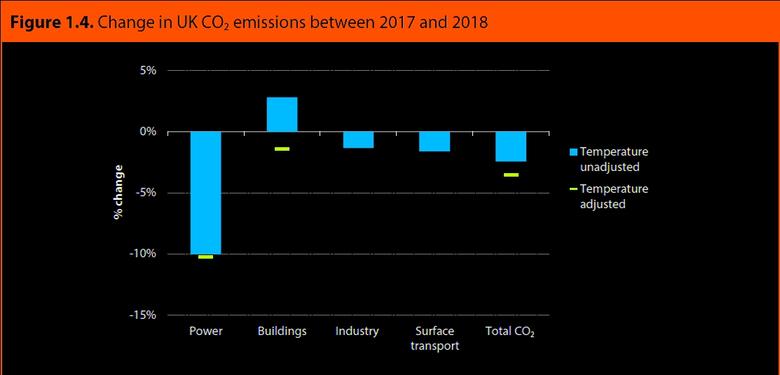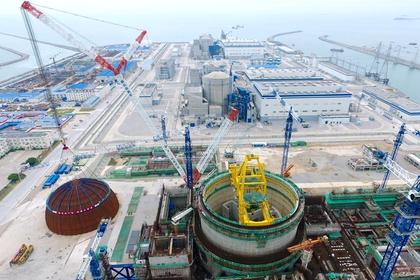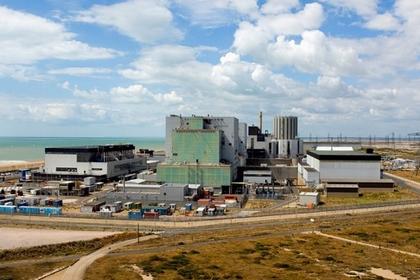
BRITAIN'S CLIMATE AMBITION

WNN - The UK government must show it is serious about its legal obligations to tackle and prepare for climate change, the independent Committee on Climate Change (CCC) said today as it published its Reducing UK emissions - 2019 Progress Report to Parliament.
The UK - which is expected to host the 2020 UN climate change summit - last month became the first major economy in the world to pass laws to end its contribution to global warming by 2050. This followed analysis from the CCC of the need to reduce its greenhouse gas (GHG) emissions effectively to zero by that year and provided evidence that it could meet this new goal at a cost already agreed by Parliament. It said the net-zero target met the UK's obligations under the Paris Agreement and reflected the urgent need for action highlighted by the Intergovernmental Panel on Climate Change last year.
In its latest report, however, the CCC notes that action to cut GHGs is lagging far behind what is needed, even before the government set the tougher new target to cut pollution to zero overall by 2050.
Lord (John) Deben, CCC chairman, said: "The UK is the first major economy to set a net-zero emissions target and intends to host the world's leaders at next year's landmark climate conference (COP26). But international ambition does not deliver domestic action. It's time for the government to show it takes its responsibilities seriously. Reducing emissions to net zero by 2050, requires real action by government now."
The CCC notes that, in 2018, for the fifth consecutive year, the sector with the largest percentage reduction in emissions was the power sector. Excluding the power sector, however, economy-wide progress was "much less positive", with emissions falling by 1.0% on average (2.0% when temperature-adjusted). Reaching net-zero emissions in 2050 will require an average annual emissions reduction of around 15 MtCO₂e (equivalent to 3% of 2018 emissions) across the economy.
In the power sector, emissions fell by 10% in 2018 to 65 MtCO₂ and are now 68% below 1990 levels, reflecting a 9% decrease in emissions intensity since 2017 to 242 gCO₂/kWh. Low-carbon generation in 2018 accounted for a record high of 54% of total UK generation (160 TWh). Specifically, renewable generation increased by 12% to 101 TWh in 2018. The share of coal generation decreased from 33% (114 TWh) in 2008 to 5% (16 TWh) in 2018. Electricity consumption increased slightly (1%) in 2018, against a long-term trend of a 12% fall since 2008.
Despite "sustained progress" in the power sector, the CCC says emissions reductions are slowing down compared to average annual reductions of 14% since 2012, reflecting "diminishing potential" to reduce emissions further by phasing out coal generation.
The report says that alongside new renewables, technologies which can offer firm and flexible power, such as nuclear and CCS, will be required for a power system in 2050 contributing fully to achieving overall net zero emissions. The scale of deployment required by 2050 will necessitate continued investment in these options between now and 2050, according to the CCC.
Tom Greatrex, CEO of the UK Nuclear Industry Association, said the report rightly highlights the "significant policy gap" that exists just to reach the nation's previous, less ambitious decarbonisation targets.
"As the committee have concluded, technologies which can offer firm and flexible power, such as nuclear, will be required to reach net-zero. The scale of deployment required by 2050 means we need to make rapid progress across all electricity sources. That is why it is both prudent and responsible for the government to assess the potential of a Regulated Asset Base model to fund large energy infrastructure," he said.
The Regulated Asset Base is a number which represents past investments, comprising what investors paid when the assets were originally privatised plus subsequent capital expenditure adjusted for depreciation.
Greatrex added: “The government has the opportunity in the forthcoming Energy White Paper to address the concerns of the CCC today, set out an enduring policy framework that will take the UK to net zero, and be a blueprint for other developed nations to do the same.”
In its report published in May - Net Zero: The UK’s contribution to stopping global warming - the CCC stated that the share of electricity generated by renewables and firm low-carbon power, such as nuclear, would need to rise from around 50% today to around 95% in 2050. Demand for electricity overall would increase due to additional demand from electric vehicles and heat pumps.
Today, the CCC said the government had delivered just one of 25 critical policies to get GHG reductions on track and was doing less to help homes and businesses cope with the challenges of a warming climate than it had been ten years ago, despite declaring a climate change emergency in May. The government now has to show it is serious about tackling the problem in the next 12 to 18 months, the CCC says, or risks being taken to court by breaking its own legal commitments.
The committee assessed 33 areas where the risks of climate change needed to be addressed, from flood resilience of properties to impacts on farmland and supply chains, and found there was no good progress in any of them. Twelve out of 33 sectors have no plans at all for dealing with climate change, the CCS says, and none out of the 33 priority areas scores well in reducing exposure to climate change.
-----
Earlier:














